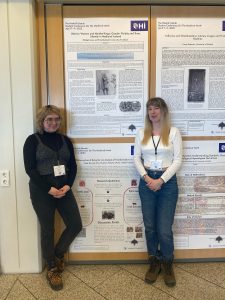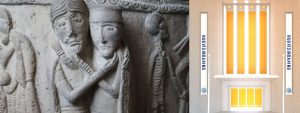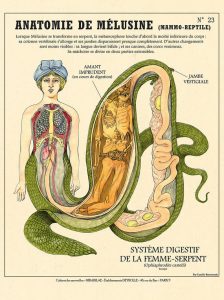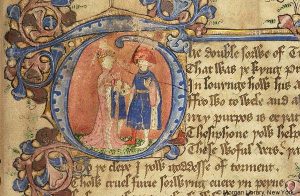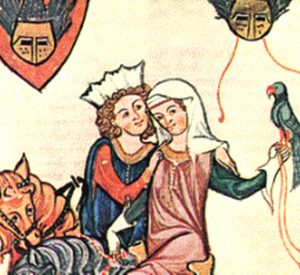Bridget, one of our Master students, has just presented a poster with Ema Grey Bushnell at the 11th University of Iceland Student Conference, The Medieval North, held 7-9 April 2022. The poster title was ‘Warrior Women and Maiden-kings: Gender Fluidity and Trans-Identity in Medieval Iceland’. Congrats to Bridget and Ema!
Category: Uncategorized
Session on emotion sponsored by project!
The project organised and sponsored a session on emotion at the Annual Congress of the Humanities, held at the University of Iceland 11-12 March 2022. All the ‘local’ team members presented their early findings, from syntactical characteristics of emotion verbs in Old Icelandic to embodied emotions and hybridity. Below is a description of the session:
Emotion in Medieval Language and Literature: Body, Medicine and the Emotional Self
This session will consider the mediation of emotion in medieval literature and language. The focus will be on the interaction and intersections between the body and the presumed emotional self, the borders between the internal and external and the role of medicine in the understanding of emotions. Moreover, the session will consider how emotions might have been perceived, understood and mediated – as somatic, medical or cognitive experiences – based on both linguistic structure and their literary interpretation. The session forms part of the international research project ‘Emotion and the Medieval Self in Northern Europe’ that is funded by the Icelandic Research Fund.
Þórhallur Eyþórsson – The Syntax of Sorrow: The Syntactic Characteristics of Some Verbs of Emotion in Old Icelandic
Sif Ríkharðsdóttir – Pain and Emotionality in Old Norse Literature
Caroline Batten – Illness, Embodied Emotion, and Old Norse Medicine
Meritxell Risco de la Torre – Hybridising Emotion: Selfhood and Emotionality in Jean d’Arras’s Mélusine ou la Noble Histoire de Lusignan
See programme
PI gives a keynote!
 Sif Ríkharðsdóttir gave the keynote lecture at the conference ‘Love and Emotion in Old Norse Literature: Patterns, Formulae, Reality’ held at the University of Tartu 27-29 January 2022. The title of the talk was ‘”Þeim var ek verst er ek unna mest“: The Concept of Love in Old Norse Literature’.
Sif Ríkharðsdóttir gave the keynote lecture at the conference ‘Love and Emotion in Old Norse Literature: Patterns, Formulae, Reality’ held at the University of Tartu 27-29 January 2022. The title of the talk was ‘”Þeim var ek verst er ek unna mest“: The Concept of Love in Old Norse Literature’.
Photo credit: University of Tartu photographer (University of Tartu website)
New team members!
Please welcome our newest team members!
 Bridget C. Leary is one of the project’s MA students. She holds a BA in Classics from University College London and is currently working on her MA thesis for the Viking and Medieval Norse Studies programme at the University of Iceland. Her thesis will analyse emotionality in the poem Sonatorrek when removed from the narrative of Egils saga in which it is now typically embedded. Her work will compare emotive scripting in the poem with other examples from the thirteenth-century emotive canon, and use the resulting evaluation as an inroad into the controversy around the date of the poem’s original composition. Her overall aim is to assess the implications that placing the poem’s composition in a thirteenth-century context would have for understandings of medieval self and identity both constructed (through the poem) and revealed (through the process of construction).
Bridget C. Leary is one of the project’s MA students. She holds a BA in Classics from University College London and is currently working on her MA thesis for the Viking and Medieval Norse Studies programme at the University of Iceland. Her thesis will analyse emotionality in the poem Sonatorrek when removed from the narrative of Egils saga in which it is now typically embedded. Her work will compare emotive scripting in the poem with other examples from the thirteenth-century emotive canon, and use the resulting evaluation as an inroad into the controversy around the date of the poem’s original composition. Her overall aim is to assess the implications that placing the poem’s composition in a thirteenth-century context would have for understandings of medieval self and identity both constructed (through the poem) and revealed (through the process of construction).
 Maximillian Jesiolowski is an MA student in the Viking and Medieval Norse Studies program at the University of Iceland and holds a bachelor’s degree in Archaeology and Ancient History from Monash University in Australia, with minors in Music and History. For his MA thesis, he aims to examine emotional states and communal and individual identities in Grettis saga Ásmundarsonar and how these concepts are reflected in the portrayal of landscape and natural environment in the saga.
Maximillian Jesiolowski is an MA student in the Viking and Medieval Norse Studies program at the University of Iceland and holds a bachelor’s degree in Archaeology and Ancient History from Monash University in Australia, with minors in Music and History. For his MA thesis, he aims to examine emotional states and communal and individual identities in Grettis saga Ásmundarsonar and how these concepts are reflected in the portrayal of landscape and natural environment in the saga.
We look forward to working with them and welcome them to our team!
Meritxell elected to the board of Hugdok!
 Meritxell has been elected to the board of Hugdok, the Association of Doctoral Candidates and ECRs at the School of Humanities, from 1 January 2022 onward. Hugdok‘s purpose is to protect and advocate for the interests of doctoral students and ECRs at the School of Humanities. We congratulate Meritxell on the election and look forward to see her promote the work of doctoral students and postdoctoral researchers in this new venue!
Meritxell has been elected to the board of Hugdok, the Association of Doctoral Candidates and ECRs at the School of Humanities, from 1 January 2022 onward. Hugdok‘s purpose is to protect and advocate for the interests of doctoral students and ECRs at the School of Humanities. We congratulate Meritxell on the election and look forward to see her promote the work of doctoral students and postdoctoral researchers in this new venue!
Grants for MA students!
We are looking for a new team member! See the ad below for information on the funding options, application deadline and other details!
Grants for MA students-spring 2022
Grants for MA students
Applications are invited for a grant to work on a MA thesis in Comparative Literature for the Spring term of 2022 under the supervision of Sif Ríkharðsdóttir, Professor of Comparative Literature, in connection with the international research project “Emotion and the Medieval Self in Northern Europe”, which is funded by the Icelandic Research Fund (RANNÍS).
The grant is a full grant for the thesis semester: 479.000 ISK (including employment related costs) per month for four months, or 1.916.000 ISK in total (including employment related costs). The thesis should entail either a in-depth case study of the correlation betwen emotion and selfhood in a single Old Norse literary work or, alternatively, engage with the interplay between emotion and selfhood in medieval Nordic literature in general. The project encompasses secular texts from roughly 1200-1500, but the theses can tackle any genre (or historical sources) that are best suited to the topic. Further information about the research project and the team, which the MA student would be joining, can be found here: https://medievalemotion.hi.is/.
The applicants should preferably be MA students in Comparative Literature, although applications from related fields will also be considered. Applicants should preferably have a background in medieval studies or a knowledge of medieval literature. The following documents should be included with the application: 1) transcript of graduate studies, 2) curriculum vitae and 3) short description of the proposed project (250-400 words). It is vital that the description detail how the thesis will be connected to the project.
The application should be marked “MA studies-Emotion and Self” and sent to the School of the Humanities: Hugvísindasvið, b.t. Eiríks Smára Sigurðarsonar, Háskóla Íslands, Aðalbyggingu, 101 Reykjavík no later than 15 November, 2022. For further information on the project please contact Sif Ríkharðsdóttir (sifr@hi.is) and for information on how to apply or details of the grant please contact Eiríkur Smári Sigurðarson (esmari@hi.is).
CFP for the final conference to be held in Iceland in May 2022!
CALL FOR PAPERS
University of Iceland, Reykjavík, Iceland
25-27 May 2022
The conference ‘Emotion and the Medieval Self in Northern Europe’ is the final event in a funded international research project. It aims to bring together a broad range of scholars working on emotion and/or selfhood in medieval literature to explore the interconnections between emotions and the medieval self across Northern and Western Europe. Selfhood is understood here as a literary selfhood, i.e. the narrative representation of a presumed subject. We are looking to foster comparative dialogue regarding the multilingual and cross-cultural representation of emotion and selfhood across Northern Europe and beyond.
Topics of interest could include (but are not limited to):
- The performance of emotion and its relation to selfhood
- Narrative staging of emotion and the presumed self
- Cultural contingencies of narrative emotionality and self-representation
- The borders of the narrative self and the illusion of ‘interior’ emotionality
- Embodied emotions
- Historicity and fictionality of emotion
- Emotion and audience reception
Plenary speakers include:
- Guillemette Bolens, Université de Genève
- Gareth Evans, University of Oxford
Proposals are invited on any of the topics above. To submit a proposal please send 300 word abstract and a brief curriculum vitae (max one page) to medievalemotion@gmail.com by 15 December 2021. General inquiries should be sent to sifr@hi.is. Notifications will be sent out by 1 Feb 2021. The conference is planned as an in-person event and registration is free of charge. The organisers plan to publish a special issue of selected papers in a peer-reviewed journal. Further information about the project can be found here: https://medievalemotion.hi.is/
PI speaking on emotion in Oxford!
Post-Doc Timothy Bourns at UBC!
The project’s postdoctoral researcher from September 2019 to August 2021, Timothy Bourns, is continuing and expanding his work on emotions and the environment this year on the west coast of Canada. Tim has joined the Department of English Language and Literatures at the University of British Columbia as an SSHRC Postdoctoral Fellow. His project is titled ‘The Nature of Emotion in Medieval Romance’, his research mentor is Professor Robert Rouse, and he is engaging with the Oecologies ‘Inhabiting Premodern Worlds’ research cluster and the Emotion & Self Psychology Lab. He will also remain connected with the Emotion and the Medieval Self project as a gestafræðimaður (visiting research fellow) at the University of Iceland’s Institute of Literature and Visual Arts.
Meri and Tim speak on ‘Emotional Selves’
The project’s doctoral student, Meritxell Risco de la Torre, and postdoctoral researcher, Timothy Bourns, were both in attendance at the White Rose 2021 Medieval Graduate Conference. The event was held online on June 17th and 18th and was hosted by the University of York and University of Leeds; the conference theme was ‘Self and Selves’, and Meri and Tim presented their research in the panel ‘Emotional Selves’. Further information about the event, including the full programme, can be found here.
Meri’s paper was titled ‘Serpentine Tears into the Sky: Selfhood, Emotionality, and the Metamorphosing Body in Le Roman de Mélusine’, and here’s the abstract:
Mélusine, as the founding mother of the house of Lusignan, has a peculiar origin story. Cursed by her fairy mother at a young age, she is forced to transform her body into a half-serpent guise every Saturday. When that monstrous bodily transformation is discovered by her own husband, Raymondin, and subsequently known by her court, the half-fairy woman flies into the sky completely transformed into a flying serpent. While her bodily transformation seems definitive, her wailing and crying into the sky is described by the narrator, and perceived by the internal audience, as the voice of a woman. The connection between body and selfhood through the representation of emotions in the story of Mélusine resonates with a contemporary audience: while the body of Mélusine changes, her humanity remains untouched, allowing her to cry human-like tears into the sky of her lands. The transformation of her body does not seem to affect the existence of her selfhood, but only the social perception of it. This paper argues that the metamorphoses of Mélusine’s body and the representation of her human-like emotional expression through wailing and tears confirms the existence of a stable, yet malleable, selfhood in the character. The previously deemed human self of Mélusine is only affected in the eyes of the society that surrounds her thanks to the visible transformation of her body, as it directly alters the (self)narrative created around her. Mélusine is, in essence, still herself, although her body has changed. Through the analysis of the changing body of Mélusine in the original romance by Jean d’Arras and the other versions of it, this paper will try and shed light on the reasons of this interest in her humanity and her selfhood through an analysis of the correlation between body, self, and emotion.
Tim’s paper was titled ‘Affective Force and Material Selfhood: The Brooches of Troilus and Criseyde’, and here’s the abstract:
Geoffrey Chaucer’s Troilus and Criseyde is one of the most powerful meditations on the nature of human love in the history of English literature. By focusing on the brooches exchanged by Criseyde and Troilus, I will argue that inorganic objects serve an important affective function within this narrative by operating as a material extension of the self.
During their first night of passionate embrace, Criseyde gifts Troilus with a brooch inset with a heart-shaped ruby, metonymically signifying her feelings for him. When the two lovers later part at the gates of Troy, Troilus gives Criseyde a tear-soaked brooch, demonstrating his sadness and ongoing affection. As her feelings shift following their separation, Criseyde passes this object on to her next lover, Diomede. When Diomede’s captured tunic is paraded in the streets of Troy, Troilus inspects the garment and his heart turns cold when he recognizes the brooch.
These objects signal the true feelings of key characters as they move from one lover to the next, with significant narrative impact and emotional consequences. The second brooch performs a communicative function, informing Troilus – and the reader – of Criseyde’s change of heart. It also produces emotional effects in Troilus; his heartbreaking discovery moves him from love to sorrow to anger. This public display of Criseyde’s changed intentions further establishes her narrative selfhood and ultimate rejection of her uncle Pandarus’ sexual machinations, in which Troilus was complicit.
Removing the traditionally anthropocentric lens of the affective turn by integrating an object-oriented approach, this article will carve new territory between emotion studies and new materialisms. Within a Chaucerian context, it offers insight into the affective force of objects and how the material can symbolically extend the self, as physical gifts bring people together – or drive them apart.

